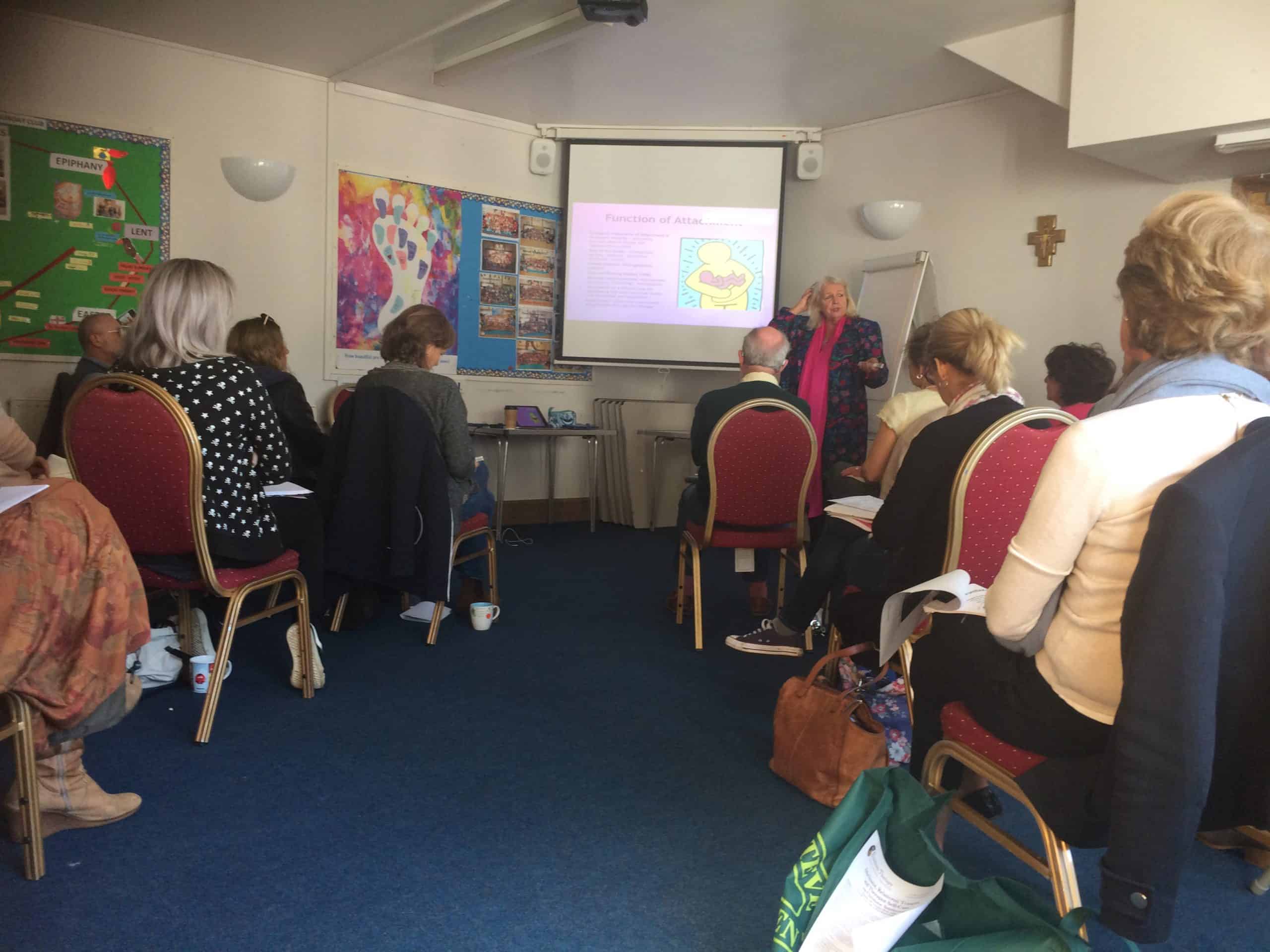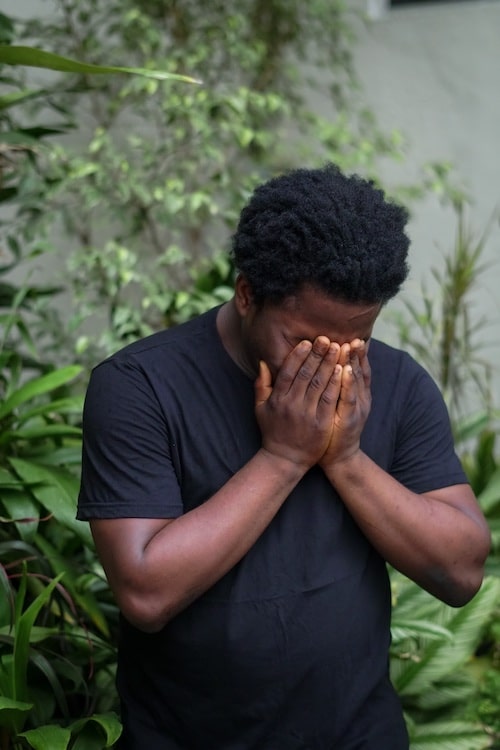We enjoyed an interesting and thought provoking in-person seminar with our host, Briony Martin. The…

Relational Trauma, Attachment & Therapist Self-Care, with Christiane Sanderson (Oct. 2018)
- The charismatic and energetic Christiane Sanderson returned to Bramham Therapy to present an immensely informative and well received seminar entitled Attachment, Relational Trauma and Therapist Self-Care. Highly acclaimed in her field, Christiane is also heavily involved in the charity One in Four which specialises in supporting survivors of sexual violence, abuse and trauma, particularly with regard to children. Christiane is the author of numerous publications on abuse including Responding to survivors of child sexual abuse, a pocket guide for professionals, partners, families and friends and Counselling Adult Survivors of Child Sexual Abuse
The aims of the seminar included :
- Looking at Attachment Theory, including identifying client and practitioner attachment style and how this can aid or hinder the therapeutic relationship.
- Why and how relational trauma occurs, and its impact on the individual and the ability to connect.
- How to engage survivors of relational trauma, and encourage and maintain the relationship, while being mindful of the client’s fears around endings and loss.
- The importance of the therapist’s self-care, identifying not only the risk of ‘burnout’ but also vicarious trauma and secondary traumatic stress.
What are our Attachments styles?
After a brief introduction we began exploring our own attachments styles through the use of the George and West (2001) Adult Attachment Projective Test (AAP). It seemed that, unsurprisingly to Christiane, many of us, although hopefully having a secure attachment style, were also able to acknowledge remnants of an avoidant style. The other common attachment styles being secure or ambivalent (preoccupied).
Four important points to note about attachment:
- As humans we are hardwired for attachment as it is a biological imperative.
- How we attach as infants is fundamental in determining how we see the world, identified by Bowlby as our Internal Working Model (IWM). The infant has a need to create a secure base from where he/she can develop self and relational worth, learn emotional self regulation and reflective functioning.
- Attachment style influences attachments throughout our lifespan.
- The attunement between the primary caregiver and infant is the key to healthy attachment. Lack of attunement, whether by commission or omission results in the same detrimental outcome.
Relational trauma:
Relational trauma happens in the context of close attachment relationships where there is a power imbalance, e.g. primary caregiver. Complex or isolated, relational trauma is caused by a consistent disruption of the child’s sense of feeling safe and loved. This is invariably as a result of either abandonment, emotional or physical, or enmeshment.
Some key facts concerning the impact of relational trauma on the individual and how they connect:
- Relationships are seen as places of fear rather than safety.
- Negative internalised messages around being unlovable.
- Difficulties around emotional self -regulation which often leads to the use of external sources of regulation i.e. work, substance abuse etc.
- An unhealthily strong dependence on the judgement of others for appraisal of oneself. Carl Rogers defined this as an External Locus of Evaluation.
- Lack of capacity for self-care
- Mind reading.
- Fear of closeness and intimacy
Attachment disorders and therapy:
Noticing a client’s attachment style in therapy is crucial in helping the therapist be attuned to the client. An avoidant client in therapy might be disconnected, give minimal answers, avoid sessions/turn up late, resist the counsellor’s empathy and display pessimism for change or experiencing intimacy. An ambivalent client can feel suffocating to the therapist, display an intense focus on relationships and be overly sensitive to any perceived signs of rejection. A disorganised client can feel chaotic, attacking, confused and dissociated.
The Therapeutic Relationship:
The relationship in therapy is crucial, and when working with a client who has suffered relational trauma, we must be forever vigilant of the danger of re-activating the trauma. Christiane talked about the importance of boundaries, authenticity, collaboration. In addition, one must remain non-judgemental, non-shaming, calm, containing, responsive and present. I felt she summed this up well when she referred to our role as therapists to be “with the client rather than doing to the client.”
Therapists self-care :
Finally we discussed our own self-care when working with clients with relational trauma. We talked of :
- Burn-out
- Compassion Fatigue
- Vicarious Traumatisation
- Secondary Traumatic Stress
Crucial to supporting ourselves as therapists, along with questionnaires such as Brian E Bride’s 1999 Secondary Traumatic Stress Scale, we must be able to share our concerns and develop supportive strategies, including reaching out to our co-workers and supervisors. It is vital that we nurture ourselves, experience a fulfilling, active personal life away from work.
Christiane’s seminar gave a very vivid and informative picture, particularly through her personal experience of working with this client group. She illustrated where relational trauma begins, how it presents itself in therapy, how we as therapists work with these clients and how, through our own self-care, we are able to fully extend our duty of care and transform this most challenging work into the most rewarding.
By Laura Ryall (delegate), October 2018
We were thrilled by the 100% 5 out of 5 scores received for our speaker (Christiane Sanderson) from 19 feedback forms.
We also received 4.89 out of 5 for the organisation of the event.
Delegates’ written comments:
- “Christiane’s presentation was high quality & the day was very engaging. She gave a clear, concise and thorough view of relational trauma and therapist self-care” C Darriet-Jones
- “The speaker was engaging and really inspirational” – Leita, RASAC (Rape & Sexual Abuse Centre)
- “Loved the presenter’s style – just fantastic”
- “Great day, amazing workshop and very knowledgeable speaker” Sarah House
- “First time here, and very impressed so all positive” Martin Fahey
- “I found all aspects interesting and useful”
- “I especially enjoyed the honesty and examples that the speaker gave” Mel Dundas
- “I valued the speaker’s willingness to engage with the participants”
- “The speaker’s use of real life examples was very helpful”
- “I valued Chrissie’s energy and way of explaining things in a way that I could understand and retain”
- “Excellent! Invite Christiane back” Jo Turner
- “Excellent – I valued the speaker’s approach” Gina Selby
- “Interesting and informative” S Gibson
Thank you to:
- Christiane Sanderson for her outstanding teaching;
- Laura Ryall for her detailed summary of the day’s learning;
- Jo Turner for her ongoing support with our events; and
- all delegates for their participation and feedback.
Wendy Bramham, October 2018
www.bramhamtherapy.co.uk




This Post Has 0 Comments